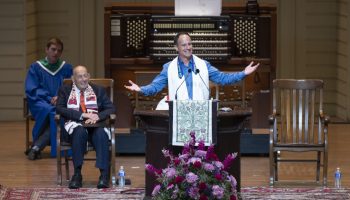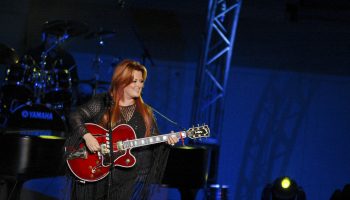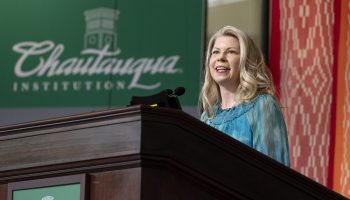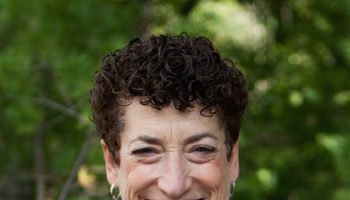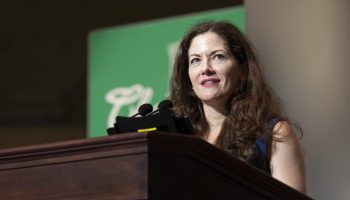Editor’s Note: Daily staff writer David Geary is on assignment for the Department of Religion this week, providing dispatches from the field as the Chautauqua community wrestles with lectures and dialogues on the theme “A Crisis of Faith?”
Evangelical Christians in America are undergoing a crisis of faith, Katelyn Beaty, the editor-at-large of Christianity Today, told a full house at the Amphitheater at Tuesday’s morning lecture. In fact, Beaty said, she thinks evangelicals face two crises: one of authority and one of identity.
It was an apt topic given this week’s theme, “A Crisis of Faith?” which the Institution organized to explore the way spirituality is being questioned and redefined in a changing America.
Beaty summarized the history of the evangelical movement before turning to the relationship between the evangelical church and America, which she called an amalgam of “the Kingdom of God and American exceptionalism.” She said American evangelicals have come to rely on strongmen and authoritarians as they search for a feeling of security while fearing a loss of cultural dominance.
While lauding them for a tradition of international outreach and contributions, Beaty said American evangelicals have “lost their footing” by growing increasingly insular and defensive, by allowing themselves to be “defined by what they are against, instead of what they are for.”
Evangelicals make up about 25 percent of the American population, Beaty noted, but they voted by 81 percent in the past presidential election for Donald Trump, a nonevangelical “man who has never asked for forgiveness.”
“The evangelical label has become political, rather than theological,” she said.
And that troubles her.
“After the election, I felt like I did not recognize my faith family,” she said.
She concluded by expressing hope that evangelicals would “reclaim their name’ and act “not from fear, but from self-sacrificial love.”
People leaving the Amp expressed a range of opinions, but appeared to agree that the presentation had been thought-provoking.
Tim and Jennifer Stone of Turlock, California, identify themselves as evangelical Christians.
“I don’t think evangelicals have lost their way, as much as that there are no clear choices,” Tim Stone said after the lecture. “We live in a state that’s very liberal and we absolutely feel under siege.”
Jennifer Stone concurred.
“Lots of people lump us in with Los Angeles and San Francisco,” she said, “but we’re not them at all.”
They both said they voted for Trump because he “was the lesser of two evils.”
“But he’s not our man,” Tim said.
Edward Braxton, the Roman Catholic bishop of Belleville, Illinois, has long been a champion of interfaith dialogue and he lauded Beaty’s “very balanced presentation.” A noted speaker himself, he has served as a chaplain at Chautauqua several times over the years.
“It was a clear and critical analysis of the complexity and diversity of evangelicals,” he said.
Mary Mulvihill of New York City and her friend, Sharon Mahar of Millbrook, are longtime Chautauquans. They said they were surprised by how much they learned from the lecture.
“I think we have the impression that evangelicals are Southerners and are, like, ‘Praise the Lord!’ ” Mahar said. “They are much more than that. It was a thoughtful analysis.”
“I never thought that evangelicals so valued an authoritarian leader,” Mulvihill said. “It seems they are drawn to an authority figure, especially if it’s a man.
“I never knew how much good evangelicals do internationally,” she added. “They are doing a lot of good in Africa, Asia and South America.”
Edward Mahoney, a theology professor at St. Michael’s College in Essex, Vermont, and a Catholic, called the talk “enlightening.”
“There is a crisis in Catholicism, too,” he said. “As I was listening, I was thinking that there are Catholics who also think the Church should not focus so much on changing the world, that it should pay more attention to its own community.”
Religion and politics continued to be the dominant theme at Tuesday’s Interfaith Lecture in the Hall of Philosophy as journalist Bill Moyers introduced the Rev. Susan K. Smith, an author, former pastor and social activist.
In America, Smith said, there are “two sacred texts”: the Bible and the Constitution. “But they are impotent when it comes to racism, sexism and inequality.”
“The words that are written are not the words that we follow,” she told the overflow audience. “The words are used to discriminate and oppress.”
“The very basic texts that you depend on to feed your soul do not mean what they are saying,” Smith said.
And there are at least two separate gods, she argued: the god of the oppressor and the god of the oppressed.
The god of the oppressor, she said, is the god of the person “who doesn’t see anything wrong with going to lynching on a Saturday night and going to church on Sunday morning.”
The god of the oppressed is the god who says “it has to be better, it has to be. It keeps you going.”
“When I hear Southern white people say ‘the good Lord’ or ‘the Lord Jesus,’ I want to puke!” Smith said. “Because your god is not my god!”
But Smith said she was not bereft of hope.
“Besides there being those two gods, there is one God,” she said. “And that God is not judgmental, is a loving God and doesn’t care if you are black, white, or purple.”
Finding that God, she argued, will require an honest dialogue on race that she said the American people have never really had.
“If you have a cancer and you don’t treat it, you will die,” she said.
Her impassioned words struck a nerve with her listeners.
“Powerful” is how Dawn Basel of Houston described Smith’s talk. She and her husband, John, said they thought the presentation was, to some extent, “preaching to the choir,” although they said the Institution would “do well to recruit more people of color” as both visitors and speakers.
“She says things people need to hear,” Dawn said. “Even the choir needs to hear this. It’s too bad the people who really need to hear it aren’t here.”
As the crowd thinned out along the brick walk, Ron Carter of East Orange, New Jersey, said he found Smith’s talk “quite fiery.”
“I grew up in the Southern Baptist Church, and she certainly called us out today,” he said. “I like to think that I have moved on into a more enlightened, inclusive place.
“It’s heartening to see a Chautauqua audience, which is mostly white and mostly older, listen and respond to a topic like this,” he added. “Not many people walked away. And that’s a good thing.”
Some were not quite as enthusiastic.
“I found it interesting,” said Joel Mott of Jacksonville, Florida, along the brick walk. “Some things she was saying I disagree with, but some other things, I could see her point. I enjoy hearing all views.”
And others were surprised.
“I go to the opera and the symphony, the cultural stuff,” said Jane Lubin of New York City, a return visitor to the Institution. “I don’t do religion, but I found this fascinating.”
She said that friends who have accompanied her in the past decided not to come to Week Three expressly because of its religious theme.
“They’re nonbelievers, and I am of that persuasion, too, but this really was fascinating,” Lubin said.

